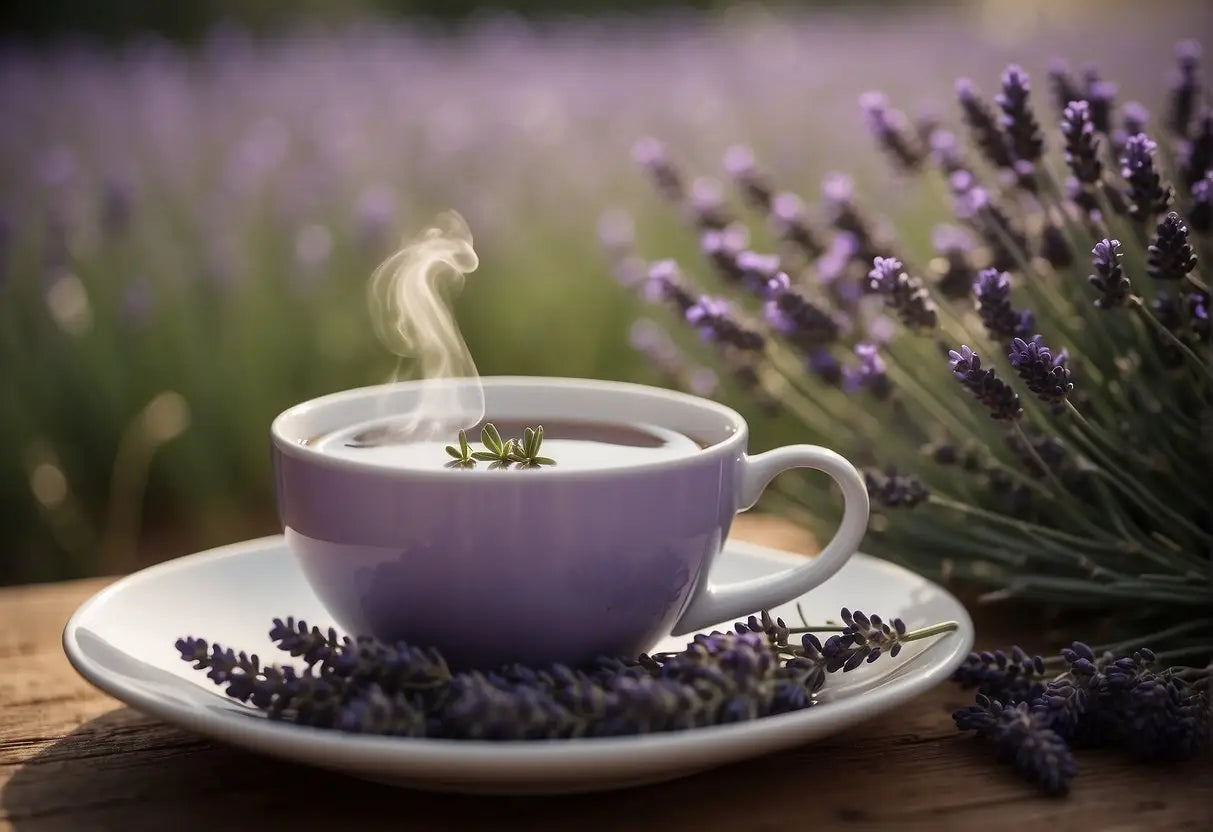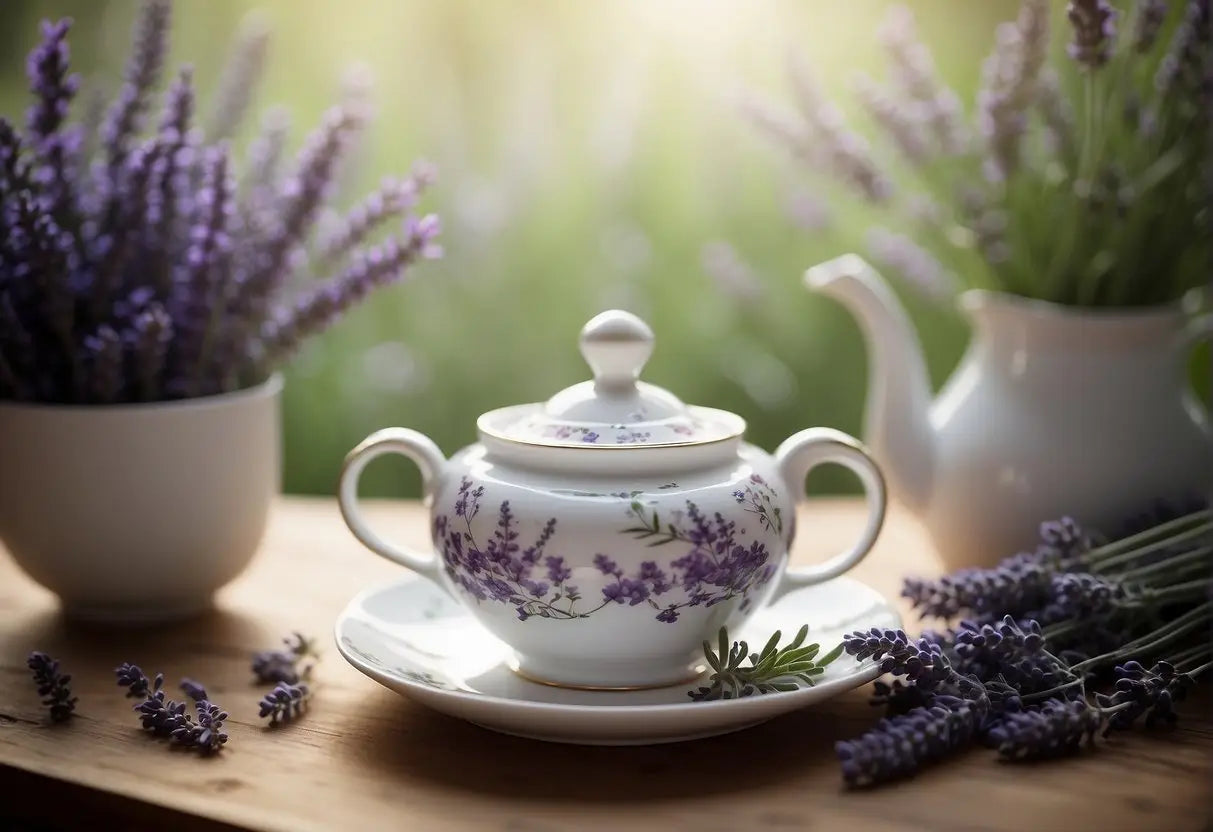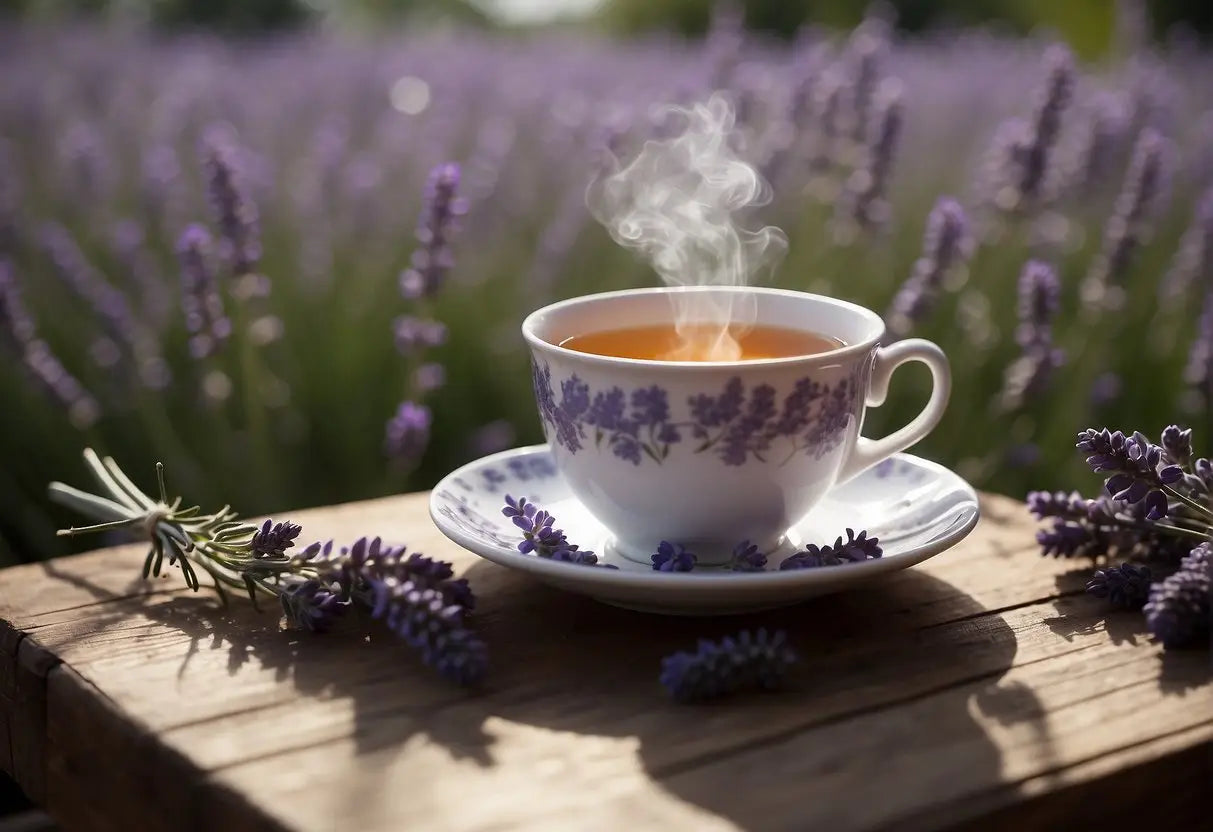What is Lavender Tea Good for
Lavender tea, derived from the purple buds of the Lavandula angustifolia plant, is renowned for its fragrant aroma and a plethora of potential health benefits. When you sip on this floral beverage, you may experience a soothing effect on your mind and body due to the presence of natural compounds within lavender.
Stress Relief: Often used for its calming properties, lavender may help reduce stress and promote relaxation.
Sleep Aid: Incorporating lavender tea in your evening routine could potentially improve the quality of your sleep.
Bestsellers
Digestive Health: Lavender has been traditionally used to alleviate various digestive issues, including gas, nausea, and indigestion.
- Antioxidant Properties: Laden with antioxidants, it can combat oxidative stress and may support overall health.
- Anti-inflammatory: It may serve as a mild anti-inflammatory, which can help with inflammation-related discomfort.
Remember to consult with a healthcare provider before adding new herbal teas to your regimen, especially if you have existing health conditions or are on medication.
Health Benefits

Lavender tea is renowned for its numerous health benefits that can positively impact your well-being.
Promotes Relaxation and Sleep
Lavender tea has a calming effect on your nervous system, which may help you relax at the end of a long day. Drinking this tea can also improve the quality of your sleep due to its naturally soothing properties.
Anxiety and Stress Relief
You can reduce feelings of stress and anxiety by incorporating lavender tea into your routine. The tea's calming scent signals to your brain to unwind, helping to alleviate stress.
Digestive Health
Regular consumption of lavender tea may aid in soothing the digestive tract. It helps in reducing bloating and gas and can be beneficial for those experiencing indigestion.
Anti-inflammatory Properties
The anti-inflammatory components of lavender tea may help to reduce discomfort associated with inflammation. This can include conditions such as arthritis or other inflammatory diseases.
Antioxidant Effects
Rich in antioxidants, lavender tea helps combat oxidative stress and can protect your cells from damage by free radicals.
Supports Immune System
Lavender tea contains compounds that may bolster the immune system. A strong immune system can help prevent various illnesses and infections.
Cardiovascular Health
Drinking lavender tea may be good for your heart. Its potential benefits include reduction of blood pressure and improvement of circulation.
Skin and Hair Benefits

Lao Ban Zhang
Lavender tea provides antioxidants and has anti-inflammatory properties that may benefit your skin and hair health.
Skin Health Maintenance
- Antioxidant Protection: Lavender tea is rich in antioxidants, which can help protect your skin from oxidative stress and minimize the appearance of aging.
- Soothing Effects: If you experience skin irritation or inflammation, drinking lavender tea might help soothe your skin due to its anti-inflammatory properties.
Hair Growth Support
- Scalp Health: The antiseptic and antifungal properties found in lavender tea can promote a healthy scalp, potentially reducing dandruff and itchiness.
- Circulation: Improved circulation from the consumption of lavender tea may encourage hair growth by delivering more nutrients and oxygen to your hair follicles.
Preparation and Usage

Before diving into the intricacies of lavender tea, it is essential to know the proper techniques for brewing and the recommended amounts for consumption to fully harness its potential benefits.
Brewing Techniques
To brew lavender tea, begin by selecting high-quality dried lavender buds. Ensure they are either culinary-grade or organic to avoid contaminants. Here's a straightforward step-by-step method:
- Boil Water: Heat water to just before boiling (around 200-210°F or 93-99°C).
- Measure Lavender: Use approximately 1-2 teaspoons of dried lavender buds for every cup of water.
- Steep: Place the lavender in a tea infuser or directly in the cup. Pour hot water over the buds and let them steep for 4-5 minutes.
- Strain: If you've placed the buds directly in the cup, strain them out before drinking.
- Serve: Enjoy your lavender tea hot, or let it cool to serve iced.
Dosage and Frequency
Regarding the consumption of lavender tea, moderation is key. Follow these guidelines:
- Dosage: Have one cup (about 8 ounces) of lavender tea at a time.
- Frequency: Limit yourself to 1-3 cups per day.
Excessive consumption may lead to unwanted side effects, so it's crucial to stick to these amounts. Pregnant or nursing women and those on medication should consult a healthcare provider before adding lavender tea to their routine.
Potential Side Effects

While lavender tea is generally considered safe for most people, there are some side effects to be aware of.
Allergic Reactions
If you are allergic to lavender, consuming lavender tea may trigger an allergic reaction. Symptoms can include:
- Mild reactions: Itching, hives, or a runny nose.
- Severe reactions: Difficulty breathing or anaphylaxis, which require immediate medical attention.
Interactions with Medications
Lavender tea might interact with certain medications. Be cautious if you take:
- Sedatives: Lavender has a sedative effect and could enhance the potency of sedative medications, leading to increased drowsiness.
- Blood thinners: Lavender can affect blood clotting and, when combined with these medications, might increase the risk of bruising or bleeding.
Frequently Asked Questions
The following subsections address common inquiries about lavender tea, focusing on how it may affect mental health, side effects, weight management, skin health, hair vitality, and sleep quality.
How does lavender tea benefit mental well-being and can it help with anxiety?
Lavender tea contains compounds that have a calming effect on your nervous system, which can alleviate stress and may help reduce symptoms of anxiety. Regular consumption can contribute to an overall sense of well-being.
Are there any known side effects associated with consuming lavender tea?
When consumed in moderate amounts, lavender tea is generally safe. However, excessive intake may lead to constipation, headache, or increased appetite. If you have allergies to lavender, you should avoid the tea to prevent allergic reactions.
Can lavender tea contribute to weight management, and if so, how?
Lavender tea may have a mild diuretic effect that helps with fluid retention. Additionally, it can provide a sense of relaxation which might reduce stress-induced overeating, though it is not a direct weight-loss remedy.
In what ways does lavender tea support skin health?
The antioxidants in lavender tea can aid in fighting free radicals, which may help reduce skin inflammation and promote a clearer skin complexion. Regular consumption might also assist in healing minor skin irritations.
What effects does lavender tea have on hair vitality and growth?
By improving blood circulation and reducing stress, which are factors that can contribute to hair health, drinking lavender tea may indirectly support hair vitality and growth.
Does drinking lavender tea have a soothing effect that can lead to improved sleep quality?
Lavender tea's natural sedative properties can relax your mind and body, making it easier for you to fall asleep and potentially enhancing the quality of your sleep. It's commonly used as a natural remedy for insomnia.
← Older post Newer post →











